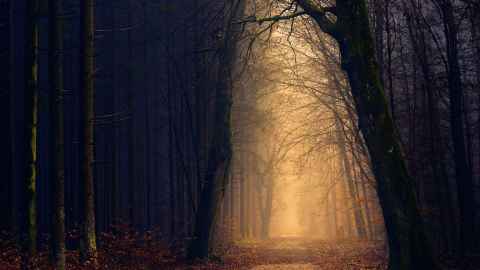Hello darkness my old friend
11 March 2019
Opinion: Light outshines darkness in the PR department, we feel safe and our day is long. But night time and darkness are key to good health, Ellery McNaughton explains.

Who’s afraid of the dark? Society in general it would seem.
Some people have good reason to be, living in places where humans are not top of the food chain, and darkness provides cover for those that are. For example, lion attacks in Tanzania were found to occur most frequently when there was little or no moonlight. Yet even in places where predation by lions is not a risk to contend with, darkness gets a bad rap.
The Dark Side, the Dark Lord with his Dark Mark, dark magic, somehow we have conflated darkness with evil. Perhaps this is because in the dichotomy of light and dark, light outshines darkness in the PR department. Light is the stuff angels wear to look suitably holy. Light signifies safe places for lion kings to rule their lion kingdoms. Light is the symbol of enlightenment and civilisation, an indicator of human innovation, technology and progress. And in the immutable logic of opposing pairs, if light equals good, then darkness must therefore equal bad. It’s algebra, or something.
We’ve become so used to the presence of light at night that we’ve forgotten it’s unnatural.
However, darkness really is our friend, preserving our sleep patterns and keeping our biological clocks running in an orderly manner. These clocks produce and regulate circadian rhythms, which is a fancy term for 24-hour processes. Circadian clocks and rhythms control important processes like body temperature, hormone production and gene expression, and are set by the periods of light and dark we experience. This is why jet-lag is a thing, as you and your clock are running on different time zones until it resets.
Ever since humans have had a clock to calibrate, the sun has been the one doing the calibration. And when the sun’s sleeping, darkness comes out to play. Like the good friend it is, darkness tucks us into bed and gives us the hormone melatonin to cuddle, which makes us feel sleepy.
Despite this kindness, it’s an unappreciated and often abusive friendship on our part. Natural darkness is being eroded away as we increasingly choose to hang out with the cool new kid, light. More than 80 percent of the world’s population lives under night skies that are brighter than their natural levels. We illuminate buildings, bridges, boulevards and billboards, creating an artificial star-scape that makes us forget the stunning natural ones we’ve hidden. Large numbers of city-dwellers never use night vision outside as the night skies are so bright that there isn’t sufficient dark for their eyes to adapt to. And all because we got rid of the darkness. We’ve become so used to the presence of light at night that we’ve forgotten it’s unnatural.
Until we as a society stop viewing darkness as a villain to be conquered, light is a necessary evil.
Then again, natural limiters of daily activity are for lesser species, and if we want to work late into the night, nothing can stop us - even if the numerous health problems should. Exposure to artificial light at night suppresses melatonin and disrupts sleep patterns, but it has also been linked to increased rates of cancer, obesity and depression. Yet some people love light so much that when their streetlights are changed to have less light spill, they buy outdoor lights to make up for the lack of illumination. That’s not just enabling a later bedtime, it is actively avoiding the presence of darkness. Why are we afraid of the dark?
While urban dwellers generally don’t have to deal with predators, in the dark we often feel at risk from other humans. Walking home at night becomes an exercise of fearful imagination, where every shadowy bush, alley or doorway becomes a hiding place for others up to no good. Light banishes the shadows and leaves no place for imagination to run riot; security lights are so named for a reason – they make us feel secure. This is in spite of the fact that several studies have found that light doesn’t appear to reliably banish the presence of the criminal element.
Of course, even if light doesn’t actually make us safe, it is important for people to feel safe in their cities. So until we as a society stop viewing darkness as a villain to be conquered, light is a necessary evil.
Ellery McNaughton is a PhD student in the Centre of Biodiversity and Biosecurity, School of Biological Sciences. This article reflects the opinion of the author and not the views of the University of Auckland.
Used with permission from Newsroom Hello darkness my old friend published on 11 March 2019.